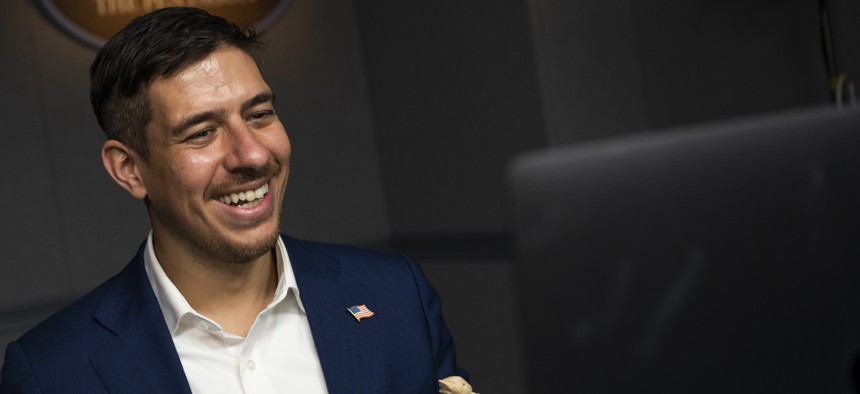
Jesse Salazar holds a prop as he prepares for a virtual event with students in Wisconsin. Lisa Ferdinando/DoD
Biden’s No. 2 Defense Industry Policy Official Leaves Post
It’s unclear why Jesse Salazar has left, the latest in a string of recent Pentagon departures.
The Pentagon's No. 2 defense-industrial-base policy official is no longer serving in the role, Defense One has learned.
Jesse Salazar, a political appointee who served as the liaison between the Pentagon and defense industry, is the latest in a string of recent senior-level departures.
A defense official confirmed Salazar is no longer serving in the Defense Department position. His bio on the Pentagon's website disappeared sometime after April 17. The reason for Salazar’s departure is not clear. Neither he nor a Pentagon spokesperson were immediately available for comment.
For several months, there have been rumblings within the defense industry that Salazar was leaving his post. His recent departure came without a public announcement.
Salazar, who served as the deputy assistant defense secretary for industrial base policy, joins two non-political tech officials in departing their positions in recent weeks. Earlier this week, Preston Dunlap, the chief architect of Air Force and Space Force, posted an eight-page memo describing bureaucratic roadblocks that he said are slowing the Pentagon's deployment of commercial tech to the battlefield. Dunlap submitted his resignation on Monday, according to Bloomberg, and quickly aired his grievances in a Tuesday appearance on Fox & Friends, where he warned the Pentagon must do a better job embracing commercial tech if it wants to stay ahead of China and other potential adversaries.
“This is something that has happened over time,” Dunlap said, “on both sides of the political aisle.”
David Spirk, the Pentagon’s chief data officer, left his post last month.
A July 2021 Baltimore Sun article called Salazar, a former McKinsey consultant, “the highest-ranking Latinx gay civilian employee at the Pentagon.”
“When I got this job, friends told me I had to clean up my mohawk,” Salazar told high school students during a November video conference, turning his head to reveal “a not too totally tight mohawk” haircut. “I said: ‘You know what, to hell with that. I’m going to do this my way.’ I’m going to go and be myself at the Pentagon and I’m going to walk with pride and I’m going to walk with confidence in who I am.”
During the presentation, Salazar lamented not being able to travel to as many factories as he wanted to, but talked about plans to visit manufacturing plants in Europe, particularly facilities focused on metals.
Salazar arrived at the Pentagon in early 2021, shortly after Congress passed legislation to create a more senior position: An assistant secretary for industrial base policy.
The Biden administration has not nominated anyone for that assistant secretary position, according to the Washington Post appointee tracker. Deborah Rosenblum, the assistant defense secretary for nuclear, chemical, and biological defense programs, has been filling in as the assistant secretary for industrial base policy in recent months.
Michael Vaccarro, a non-political, senior civil servant, is temporarily filling Salazar’s old position in addition to his regular job as director for international armaments cooperation.
Over the years, the head of industrial base policy has been the Pentagon official who interacts with defense companies on a daily basis. The health of the U.S. industrial base has been a major concern of both top Pentagon officials and lawmakers. The coronavirus pandemic has caused problems and delays throughout the weapon supply chains.
During a congressional testimony in May 2021, Salazar said his goals were “to build a healthier and more resilient industrial base that deters conflict, protects our national security, and enables global economic leadership.”







